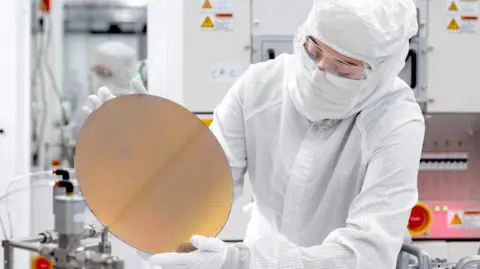In a groundbreaking announcement, Texas Instruments (TI), a leading player in the semiconductor industry, revealed plans to invest over $60 billion in the United States. This significant investment comes as a response to increasing pressure from the U.S. government, particularly from former President Donald Trump, who has been actively urging major technology firms to enhance their manufacturing efforts within American borders.
Texas Instruments is set to expand or develop seven semiconductor fabrication facilities across three sites located in Texas and Utah. This ambitious project is anticipated to generate around 60,000 new jobs, although the company has yet to disclose a comprehensive timeline for the implementation of these plans. The Dallas-based company characterized this investment as “the largest investment in foundational semiconductor manufacturing in U.S. history,” highlighting its importance in revitalizing the domestic chip production landscape.
The announcement from TI follows a similar trend observed among other semiconductor manufacturers. For instance, Micron Technologies recently stated it would increase its planned investments in the U.S. to an impressive $200 billion. These moves underscore a broader commitment among the industry to bolster semiconductor production in the face of rising global competition and shifting market dynamics.
U.S. Secretary of Commerce Howard Lutnick emphasized the significance of this partnership, stating, “President Trump has made it a priority to increase semiconductor manufacturing in America.” He expressed confidence that TI’s investment would support U.S. chip manufacturing for many decades. This sentiment reflects a broader national strategy aimed at reducing reliance on foreign semiconductor supply chains, particularly in a geopolitical context marked by tensions with countries like China.
Despite the enthusiasm surrounding TI’s investment, some analysts have expressed skepticism regarding the motivation behind such large financial pledges. There are opinions suggesting that companies like TI may be attempting to appease the former Trump administration, which had threatened to cancel the CHIPS and Science Act funding, a substantial initiative introduced by President Joe Biden. This program includes a significant $1.6 billion subsidy finalized last December for Texas Instruments, which had already outlined plans to invest at least $18 billion to establish three new facilities.
Additionally, Trump has hinted at the possibility of imposing new tariffs on semiconductor imports, further highlighting the government’s aggressive stance toward domestic manufacturing. Texas Instruments, unlike some of its competitors like Nvidia — which specializes in advanced artificial intelligence chips — primarily produces foundational chips utilized in everyday consumer electronics, automotive applications, and more.
The company’s global presence is noteworthy, with 15 operational sites worldwide, encompassing facilities in both the United States and Asia. Texas Instruments boasts a diverse clientele that includes industry giants like Apple, SpaceX, led by Elon Musk, and automotive titan Ford. However, it has increasingly encountered competition from low-cost Chinese manufacturers, posing challenges to its market position in the foundational chip sector.
In summary, Texas Instruments’ monumental investment reflects not only the company’s commitment to enhancing its production capabilities but also a strategic response to a rapidly evolving global market and national policies aimed at fortifying America’s semiconductor industry. As TI embarks on this ambitious expansion, the implications for job creation, technological advancement, and international competition in the chip industry will undoubtedly resonate throughout the economy for years to come. This investment signifies a pivotal moment in U.S. manufacturing, aiming to reclaim leadership in a sector critical to modern technology and innovation.



